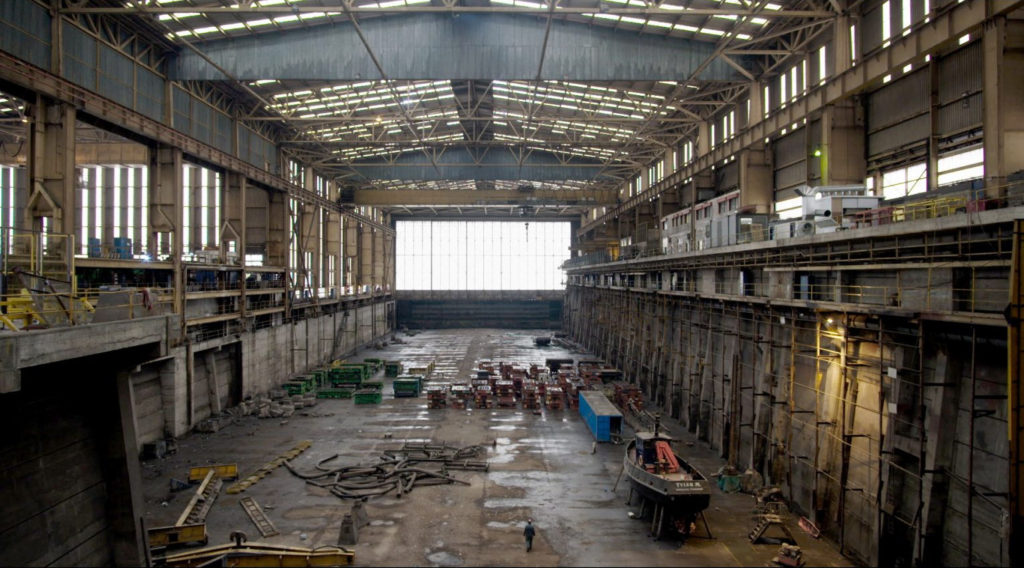Review: Mind the Gap (2019)

It is not a mystery any more, if it ever was, that the rise of populism in Europe is rooted not only in the political processes, but also, even predominantly, in the economic ones. The leftist, social-democratic parties have been shifting their focus to identity politics more appealing to middle and upper-middle class voters and leaving their working class bases behind by adopting some, if not all of the neo-liberal market policies. The populists all over Europe are becoming more and more appealing to the people left behind, by offering them easy targets to blame: the impersonal bureaucracy of the European Union and the others, such as immigrants, foreigners, minorities. However, the key thing here is the feeling of being left behind and let down by the national governments who serve the interests of the market rather than those of their peoples.
Roughly speaking, that is the topic and the basic thesis of Robert Schabus’ documentary Mind the Gap. The film premiered at last year’s edition of CPH:DOX and had its limited theatrical release in January in Austria. It was selected for this year’s Diagonale that was cancelled due to pandemic, which will certainly affect its chances for a wider theatrical distribution. However, its topic and its clear methodology make it almost ideal for television and video platforms.
Mind the Gap is divided in chapters that are addressing specific problems in the context of specific countries that are facing the surge of populism. In France, it is about factories closing due to outsourcing the work to cheaper labour in the Eastern Europe, leaving many workers unemployed. In Germany, it is about the repercussions of the infamous Hartz IV labour market reform that forced people to take any type of work, even if it was poorly paid. In the UK, the light on Brexit is shed from the point of view of working class people and small business owners who witnessed the decline in the national industry and blamed the EU for not letting the government assist the facilities that ended up defunct. In Grece, it touches the consequences of austerity programs for the local economy. And in Austria, it deals with the immigration in the sense of the pressure in puts on social and public services, as well as on the labour market.
-

© Robert Schabus -

© Robert Schabus
All of the chapters are introduced by a title card explaining the political context and all of them are narrated by regular people who are or at least might be the populist voters for their own concrete reasons. They are not shown as a dehumanized masses that chant the political slogans, but in their work environment (if they are “lucky” enough to work) or at their homes, giving them the chance to state their cases and opinions freely. Each chapter is followed by an interlude where the various intellectuals, economists, journalists, politicians and political and social scientists offer a deeper, sometimes even philosophical context behind the phenomena and the processes that are affecting the common folk.
Style-wise, Mind the Gap is a bit bland and that is the consequence of its story-telling clarity. Simply put, there is not much that Schabus can do, since it is basically a series of interviews that can be cut only by an establishment shot here and there. Surely, the dynamism of work environments and several scenes shot in the cars of the subjects helps a bit, but there is a limit to how much it can do.
When it comes to content, the segments are uneven and the last one, set in the director’s home country offers too much points of view in a very limited time, creating the feeling of not being able to go in depth. It would probably work better with more material and more time in a separate documentary feature. Also, except from one brief excursion to Poland in the first, “French” segment that also deals with the possibilities of outsourcing of the already outsourced work further east and the pressure that the work force from Ukraine puts to Polish workers’ wages, Mind the Gap does not dwell much on the even more dangerous blend of populism that is already in power in the Eastern Europe. Some of the aspects are being touched by the expert interviewees in the interludes (the problem of depopulation and the lack of diversity), but it was clearly not Schabus’ focus. Nevertheless, the filmmaker succeeds in his efforts to make Mind the Gap a compelling expose on an important subject.
Original title: Mind the Gap
Year: 2019
Country: Austria
Languages: French, English, German, Greek, Polish
Runtime: 86′
Directed by: Robert Schabus
Written by: Robert Schabus (concept)
Cinematography by: Jakob Fuhr, Lukas Gnaiger
Editing by: Oliver Neumann, Robert Schabus
Assistant director: Marie-Therese Vollmer
Graphics by: Ralf Ricker
Sound design by: Andreas Frei
Colorist: Tom Varga
Produced by: Helmut Grasser
Line producer: Katharina Bogensberger
Production company: Allegro Film
















